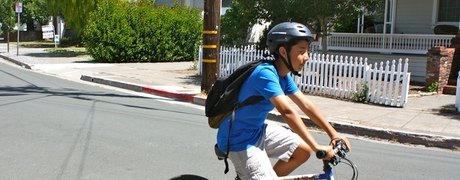Student commutes at seven local high schools generate 13 million pounds of greenhouse gas each year,  according to surveys conducted by students participating in the Climate Protection Campaign’s ECO2school program.
according to surveys conducted by students participating in the Climate Protection Campaign’s ECO2school program.
The survey is part of the year-long effort by students to encourage classmates to walk, bike, ride the bus, and carpool to school. ECO2school is training students to be leaders on climate protection, including changing commute patterns.
The portion of students getting to school in single passenger cars ranged from 45 percent at Casa Grande High to 59 percent at Analy High. Only 15 percent of students at the seven schools walk or bike to school and five percent ride the bus. The school with the lowest emissions per student is Healdsburg, where a third of students walk or bike to school. The highest emissions per student are at El Molino, where less than one percent of students walk or bike to school.
Now that the schools have established baseline data, students will conduct an educational campaign in April with incentives to change commute habits. They will then do another survey to measure the impact. Based on similar initiatives in previous years, we expect an emission reduction of about 20 percent from the program.


